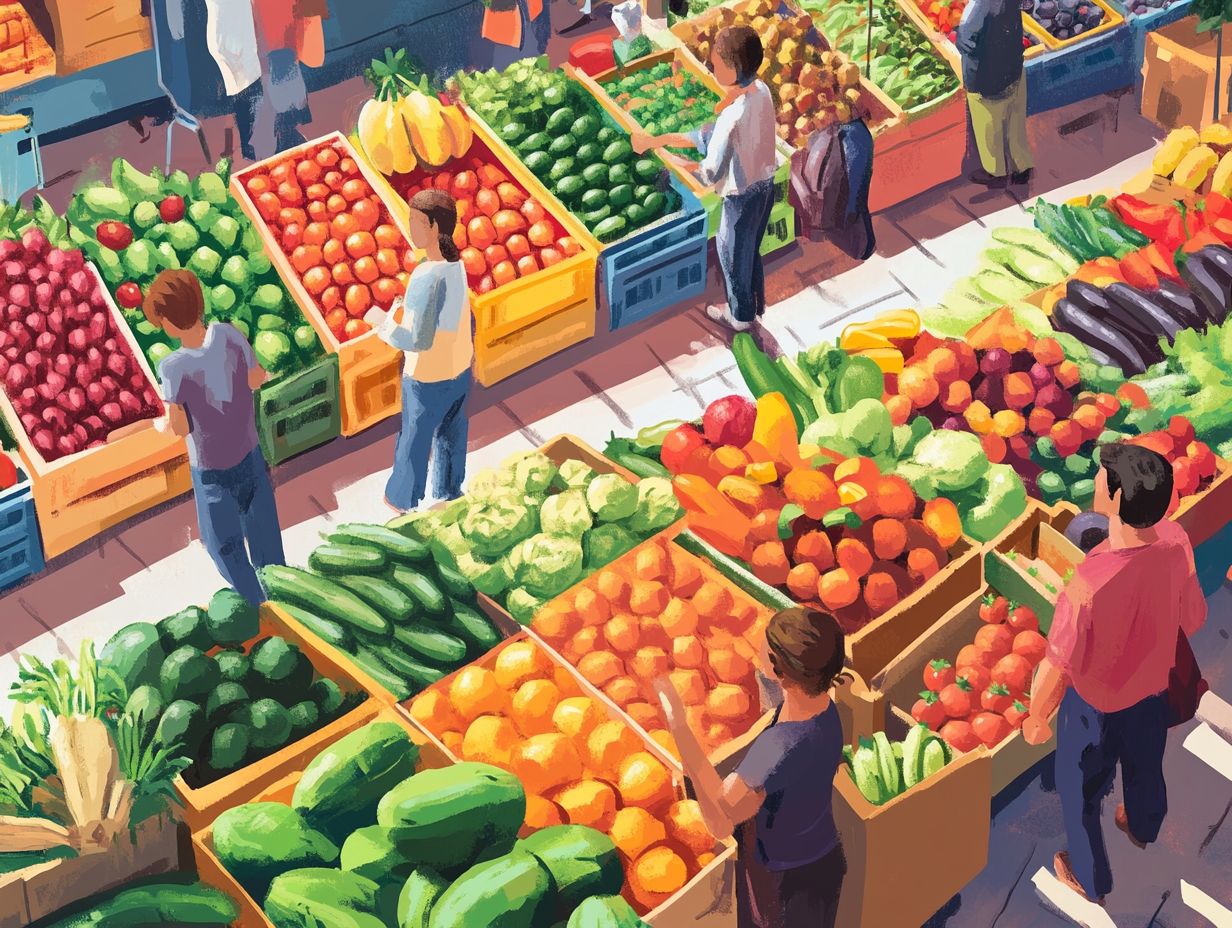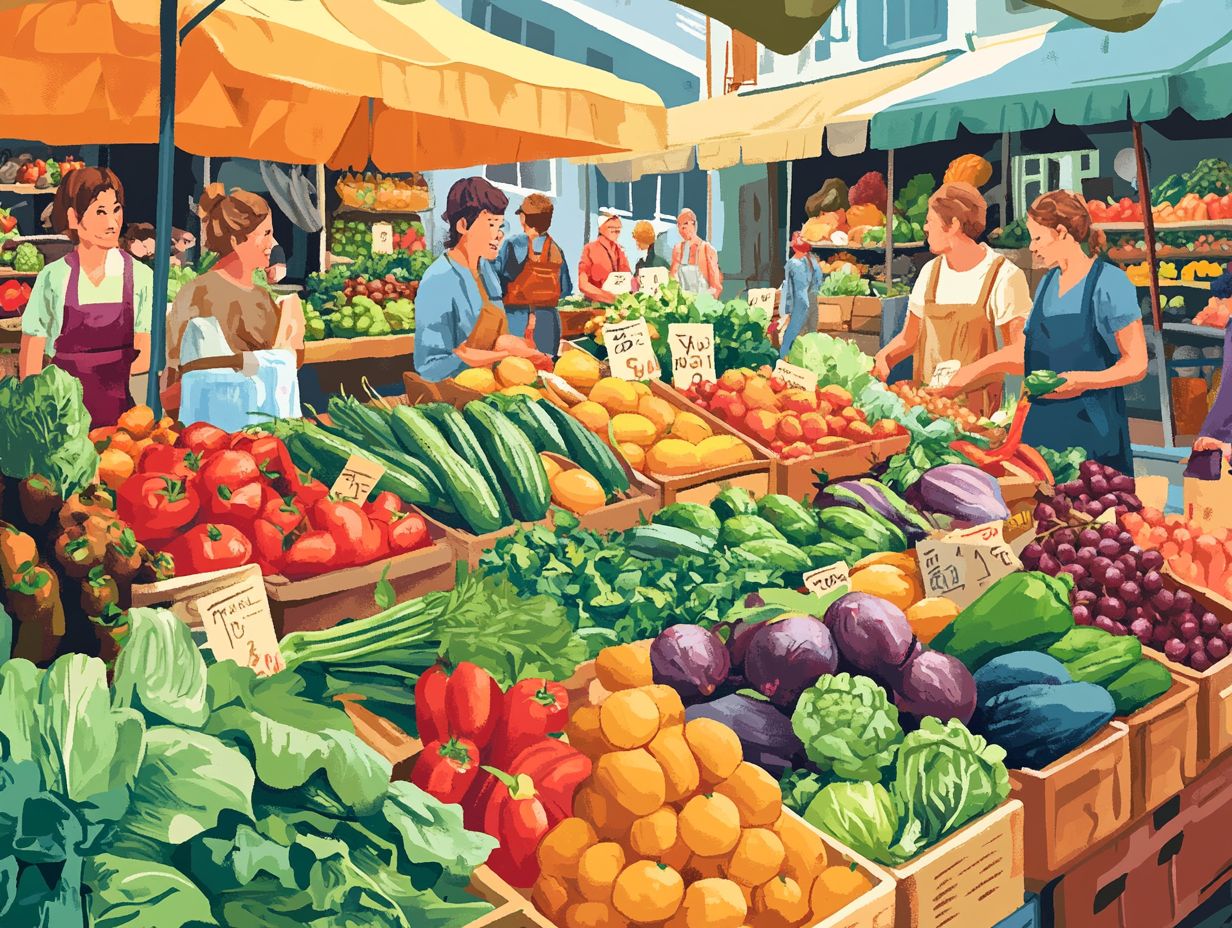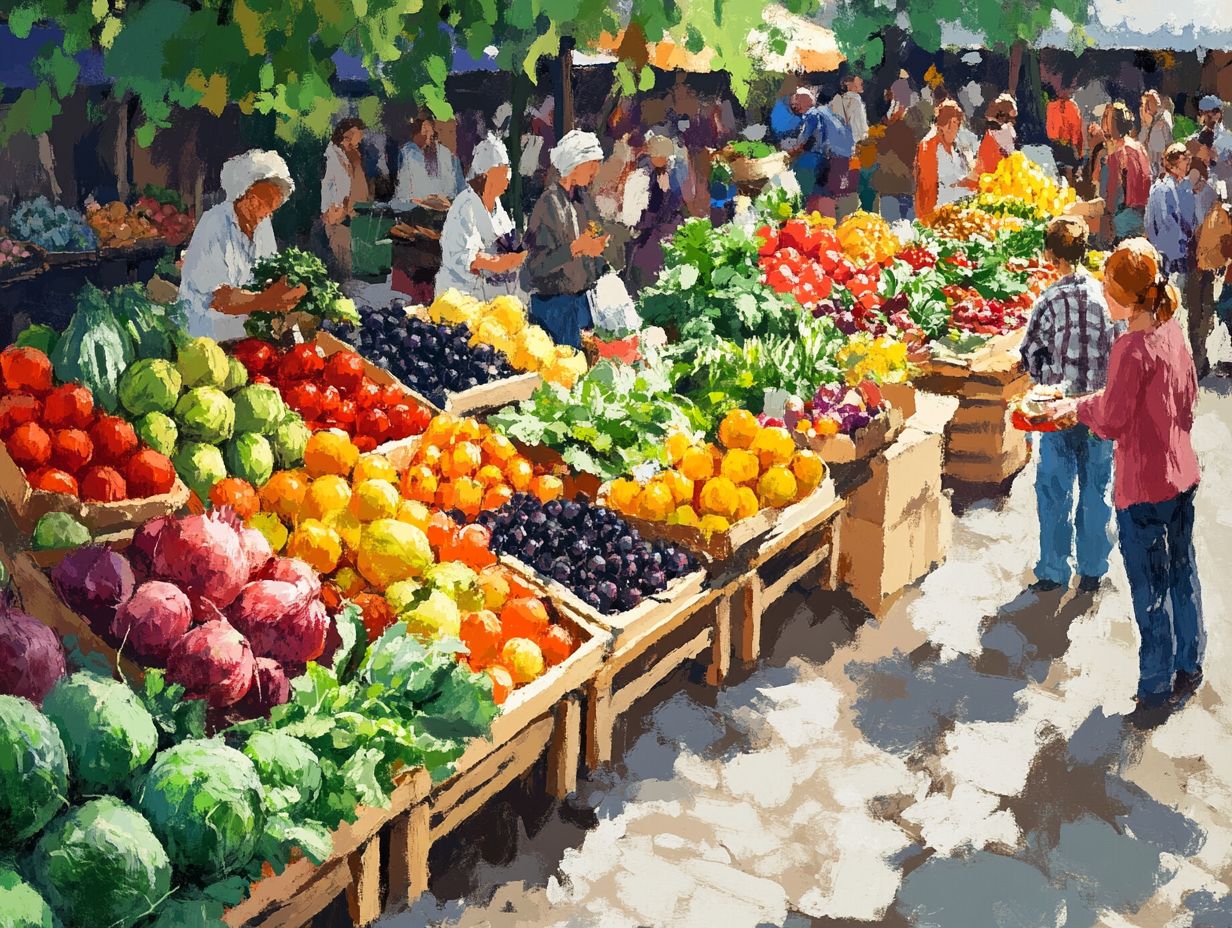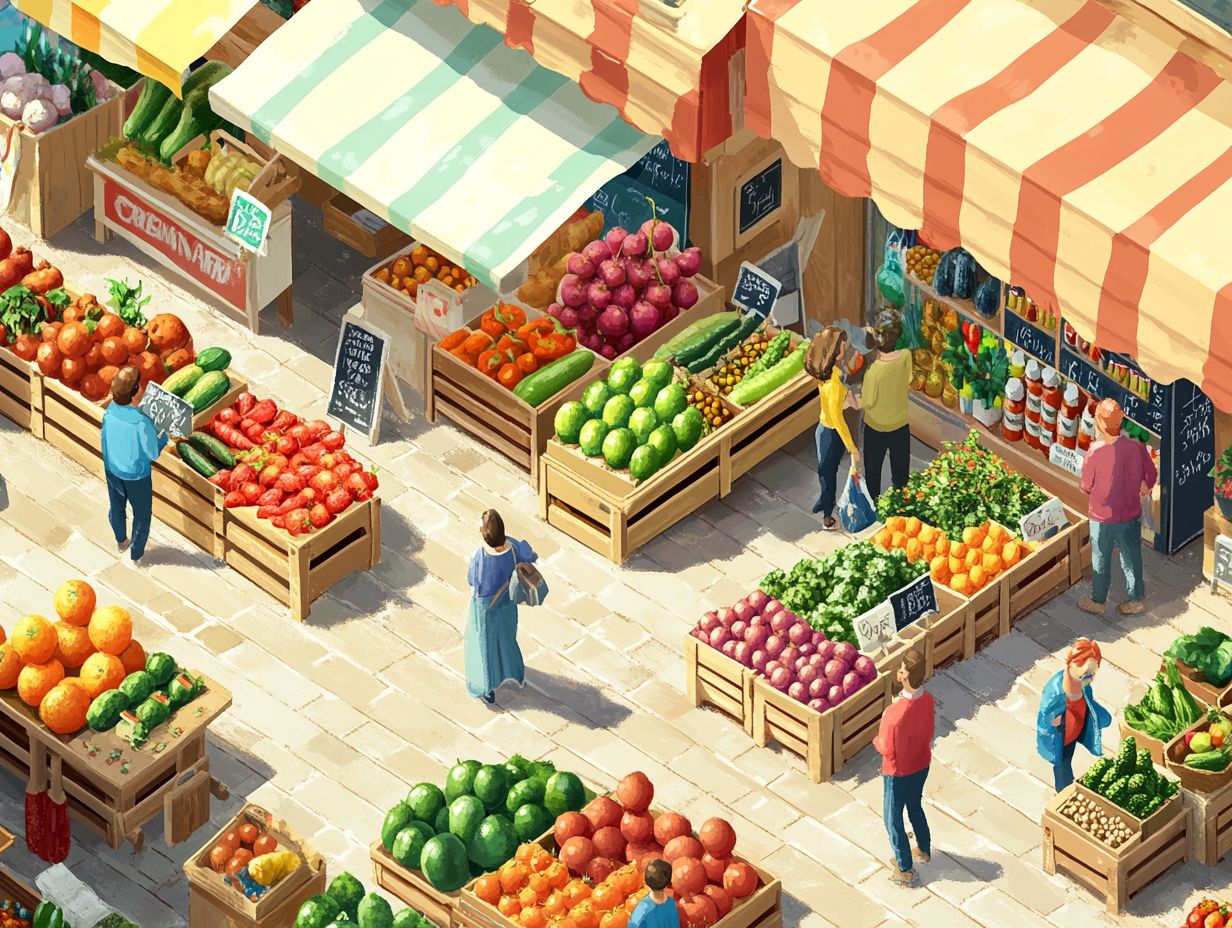Is Buying Organic Food Really Worth the Extra Cost?
In a world that’s all about **health** and **sustainability**, you might have noticed that organic food has become super popular.
But what does it really mean for food to be **organic**? This article digs into the complexities of organic food, weighing its **environmental** and **health benefits** against those higher prices and the challenges of finding it.
You’ll also pick up some practical tips for making organic purchases without emptying your wallet. By the end, you’ll have a clearer understanding of whether buying organic is **worth it** for you.
Understanding Organic Food

Understanding organic food is key for anyone wanting to make smart dietary choices that fit with their health and environmental values.
Organic food means products grown using sustainable farming methods that focus on soil health, biodiversity, and steering clear of synthetic pesticides. When you choose organic, you’re not just going for better food quality; you’re also backing agricultural practices that cut down on the carbon footprint and promote ethical consumption.
Plus, with more people leaning toward natural ingredients these days, getting to know about organic certification and its impact on food production is more relevant than ever in today’s market.
What Makes Food Organic?
Food is considered organic when it meets specific standards that limit the use of synthetic additives, pesticides, and genetically modified organisms (non-GMO). This ensures that what you’re eating is produced in a way that supports both your health and the environment.
Think of methods like crop rotation and organic certification; they’re all about keeping things transparent and high-quality throughout the food supply chain.
These standards are set by regulatory bodies to make sure organic food is free from the harmful residues you might find in conventional farming. A big part of organic farming involves using natural fertilizers and pest management strategies that encourage biodiversity and keep soil healthy.
Organic certification is super important because it gives you peace of mind, assuring you that the food you’re buying meets strict safety protocols. By choosing products that are certified organic, you can feel more confident in your food choices, knowing you’re supporting sustainable practices while also prioritizing your health by cutting down on chemically treated foods.
Pros of Buying Organic Food
Buying organic food has a bunch of benefits that can really boost your health and well-being, plus it helps the environment too.
Organic products typically pack a higher nutritional punch, often containing more nutrients and fewer chemical residues. This can lower your health risks related to pesticide exposure.
On top of that, when you choose organic, you’re supporting farming practices that promote biodiversity and soil health. It’s all about fostering sustainable ecosystems and backing community-supported agriculture.
Environmental Benefits

The environmental benefits of buying organic food are pretty impressive. When you choose organic, you’re supporting sustainable farming practices that help reduce carbon footprints and promote biodiversity.
Organic agriculture takes care of soil health by using natural fertilizers and compost, which makes ecosystems stronger and more resilient against pests and diseases—all without the need for harmful chemicals.
But it doesn’t stop there. Organic methods also play a big role in water conservation by minimizing runoff and keeping water sources clean from pollutants.
By steering clear of synthetic pesticides and herbicides, organic farming protects aquatic ecosystems and encourages the preservation of natural habitats that wildlife depends on.
When you commit to sustainable agricultural techniques, you’re making a statement about responsible consumption. You have the power to make choices that support ecological integrity, ensuring that future generations inherit a healthier planet.
This holistic approach focuses on reducing harmful chemical use, creating an environment where both soil and water can thrive.
Health Benefits
You’re probably noticing that the health benefits of consuming organic food are getting a lot of attention, especially among those who really care about what they eat.
When you choose organic products, you’re often opting for something rich in antioxidants, vitamins, and minerals—a wholesome alternative that can boost your overall wellness while keeping you away from harmful pesticides and chemical residues.
Research suggests that eating organic food might actually enhance how well your body absorbs nutrients, making it easier for you to utilize those vitamins and minerals. Plus, studies have shown a link between organic food consumption and lower rates of certain health issues, like obesity and heart disease.
With more and more evidence supporting organic diets, you might find yourself among those embracing these options as part of a well-rounded approach to health. It aligns perfectly with the current trends in wellness that emphasize clean eating and sustainable choices for long-term vitality.
Cons of Buying Organic Food
Buying organic food has its perks, but let’s not ignore the downsides. The biggest drawback is that it often costs more.
Those organic products usually come with a higher price tag because of the strict certification processes and sustainable farming methods involved. So, as you’re navigating your food budget, it’s likely you’ll find yourself doing some price comparisons to see what fits best.
Higher Cost

One of the biggest challenges you might face when buying organic food is the premium pricing, which can be a real hurdle for many shoppers. The organic certification process is important for ensuring quality and sustainability, but it also adds to production costs, leading to those higher prices at the grocery store that you’ll need to factor into your food budget.
These elevated costs can come from several factors, like more rigorous farming practices, smaller scale production, and the lack of synthetic pesticides and fertilizers. Farmers often put their money into organic methods that focus on environmental health and biodiversity, which sometimes means sacrificing yields in the short term for better soil quality down the line.
If you’re motivated by health concerns and environmental issues, you might find yourself weighing the benefits of organic food against your budget. Ultimately, you’ll have to decide whether that premium price tag is worth it.
Understanding these dynamics can help you make informed choices in the marketplace while keeping your financial situation in mind.
Availability and Accessibility
One downside of buying organic food is that its availability can really depend on where you live and what local produce options you have. Even though organic products are becoming more popular, you might not always find them stocked in your neighborhood grocery store, which can make it tough for you to make food choices that match your preferences.
Seasonal factors also play a big role in this issue. You might notice that the types of organic produce available locally can change throughout the year, leading to some frustration when you’re trying to prioritize fresh, organic options but come up against limited selections.
Plus, relying on local farmers’ markets or specialty shops can sometimes be a hassle, especially if they have restricted hours or aren’t always open. This can make your quest for sustainably sourced food a bit more complicated.
In the end, these challenges can really hold you back from fully embracing an organic diet, even though you might be interested in making healthier and more environmentally friendly choices.
Factors to Consider When Deciding Whether to Buy Organic
When you’re deciding whether to buy organic food, there are a few key factors to think about that can really shape your dietary choices and overall food experience.
Your budget and priorities will play a significant role in how much you can spend on organic products. Plus, getting a grasp on what organic labeling really means can help you make informed decisions about food quality and safety.
Budget and Priorities

Your food budget and personal priorities play a big role in deciding whether to add organic food to your diet. You might find yourself navigating the tricky world of price comparisons, weighing the perks of organic products against your overall dietary choices and financial limits.
As more people start craving organic produce, it becomes even more important to make informed choices about when and how to buy these items. To successfully work organic foods into your budget, consider prioritizing based on what’s in season or sourcing locally, which can help keep costs down.
You might also think about focusing on buying organic versions of certain high-pesticide items while opting for conventional alternatives for others. These strategies not only help you manage your finances but also show your commitment to healthier eating habits and sustainable practices, ultimately shaping your personal and household dietary preferences.
Importance of Organic Labeling
Understanding the importance of organic labeling is key to making informed food choices. It gives you insight into where your food comes from and how it’s produced.
When you see labels that meet organic standards, you can feel confident that you’re not falling for misleading health claims and that you’re getting quality products.
These labels act like a guiding light for anyone looking to prioritize their health and the environment, significantly influencing your purchasing decisions.
When you come across reputable organic certifications, you’re likely to see those products as healthier and more ethically produced compared to conventional options. This trust builds loyalty and encourages you to seek out organic products more often, reinforcing the idea that choosing organic isn’t just a passing trend—it’s a commitment to healthier living and sustainability.
Tips for Buying Organic on a Budget
If you’re on the hunt for organic food without emptying your wallet, there are some great shopping strategies and alternative options you might want to consider to keep your food budget in check.
Checking out community-supported agriculture programs or using price comparison tools can help you score high-quality organic products without the hefty price tag.
Shopping Strategies
Implementing smart shopping strategies is essential for making the most of your budget while buying organic products. By prioritizing local produce and being aware of what’s in season, you can optimize your food sources, support your community, and even reduce your carbon footprint.
Shopping directly from farmers’ markets or getting involved in community-supported agriculture (CSA) programs not only gives you access to fresh, organic options but also helps strengthen local economies. When you choose seasonal fruits and vegetables, you’re treating yourself to produce at its peak flavor and nutritional value, often at better prices.
Plus, buying in bulk from local co-ops can lead to some significant discounts.
Engaging in meal planning, keeping an eye on store flyers, and prepping a shopping list can take your cost-saving strategies to the next level. And don’t forget to explore local online marketplaces for organic goods—they often have great deals that support farmers while making your eco-conscious shopping a little easier.
Alternative Options
Exploring alternative options for sourcing organic food can really make a difference in your food budget while ensuring you get fresh, high-quality products. Community-supported agriculture (CSA) programs and local farmer’s markets are fantastic alternatives that often offer organic produce at prices that won’t break the bank.
When you join a CSA, you’ll receive a share of seasonal produce straight from local farms, which not only guarantees freshness but also gives a boost to local agriculture.
On the flip side, farmer’s markets offer a lively shopping experience where you can chat with growers, learn about their farming methods, and choose from a wide variety of organic products. Plus, many farmers at these markets offer discounts for buying in bulk, which is perfect if you’re trying to save a few bucks.
By exploring these local sourcing options, you can give the power to yourself to make healthier choices while keeping your finances in check.




